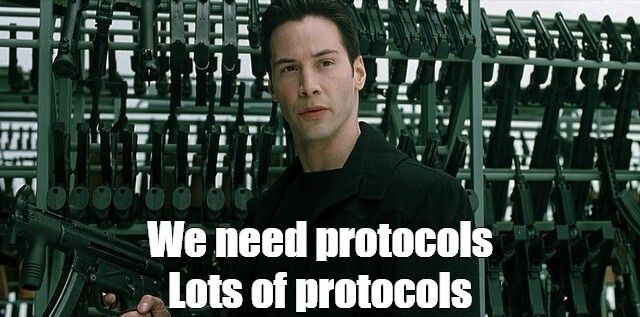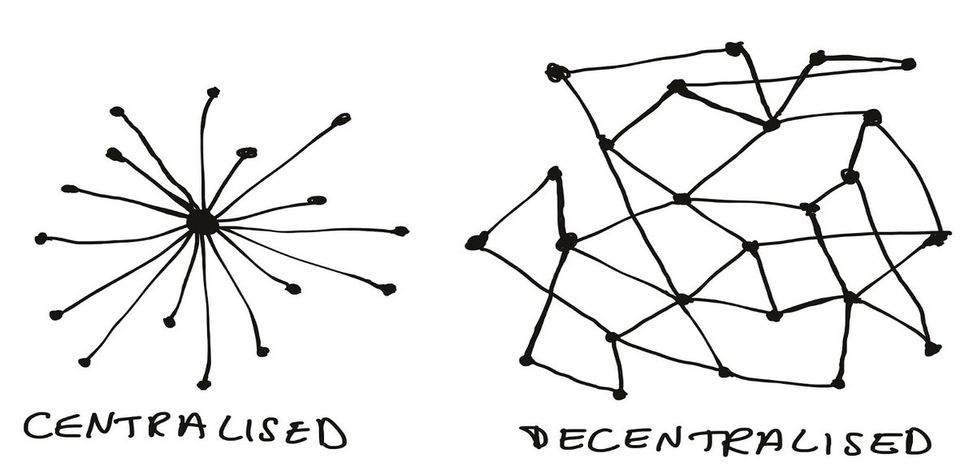This post is a thought dump of a 40-hour worth of no-internet flight time I had over the last week. It was rough.
Intro
This is not meant to be a linguistics lecture but more of an attempt to set a mental model for what the word decentralization in the blockchain space can mean. You probably ran into angry tweeps claiming true decentralisation is not possible and crypto bros saying governments will be managed by DAOs in the future. But are they talking about the same thing? Can we define what decentralisation is? is it even one thing?
The goal from this blog is to go over some of the decentralization ethos, how they can manifest in the crypto space and what does that all mean for you.
New word: Polysemy
I was trying to find the English expression for "A word that has the capacity to mean many things" and it seems Polysemy is just that. In engineering capacity, I'm usually very reluctant of using the words decentralized/decentralization/decentralize liberally without clarifying "Decentralization of what?"
So I guess this is a good space to go over all the ways Crypto is decentralized (and sometimes not at all).
The core definition of decentralization is the dispersion of power. It's very important to let this settle in. My view of decentralization is that it breaks down powerful singletons but it does not promise complete freedom. It follows economical consensus in decision making. Blockchains build over this concept by implementing different economical guarantees to incentivize productive behaviors and disincentivize malicious ones.
Decentralization of Opportunity
This is the most obscure term but the one I like the most. Decentralization of opportunity means that opportunities in markets (DeFi, creative, insurance, etc) should be fairly available across the globe.
One of the usually debated topics about crypto is "why the hype on a seemingly expensive way to do exactly the same things we used to do before?" At the end of the day, you can browse the internet, watch videos, trade stocks and put your money in a bank without blockchains right?

For me, decentralization of opportunity is one of the biggest factors that sold me on crypto and blockchains. If there is a better alternative that offers the same decentralization of opportunity the same way crypto does, I'm a buyer.
There are many many examples how the current financial/technology sectors are NOT fair and walled from the public. It becomes much clearer when you study how VCs behave where their portfolios are in conflict, the "buy the market first" by company S and it's backers or nasty deplatforming techniques by company A. It's also very apparent for anyone who spend 10 mins to study the current financial system especially on the trading arm. I want to dig deeper into both themes starting with the latter and break down how decentralization of opportunity has a huge potential.
Why it's not fair for you to trade on the stock market today?
To place a trade as a retail investor, let's say for AMD stock, you are placing yourself under the mercy of 3-4 corporates. Let's dig deeper how this happens:
1- Alice places a trade BUY 100 AMD on broker X
2- Broker X now does two things, it gets it's slippage/spread % and trading fee (% or const) from Alice's account and match Alice from an opposing trade on it's order book (Think about it as a SELLER selling 100 AMD, but it's more complicated than that)
3- Moreover, that SELLER is a market maker 75-80% of the time (US market datapoint) and is the SAME market maker 35% of the time. In a traditional financial system, a market maker is a corporation that pools money from wealthy individuals, trades with very large volumes with the goal of making money by buying from sellers at price and selling again at a higher price. They benefit from much better prices, they can front run retail (most market makers are literally hardwired to exchanges so they can submit trades quicker than anyone) but they pinky promise they won't do any of that. I guess you'll have to trust them.
4- Taking it one notch up, Your broker can (and boy they do) share your trading data to a market maker before they execute your trade, giving them a huge advantage on the price they set for your order (and other people's)
5- On the blurry lines between what's legal and what's right, Your broker can totally manipulate trading and halt your trades if it doesn't work out for giants footing their bill.
The biggest things to notice about this paradigm is not the flagrant unfairness of this model or the strong misalignment in incentive. For the sake of our attempt to define decentralization of opportunity, the most important part in our previous model is permissions. To become a market maker you need permission from every exchange, to participate in market making you need to meet a very large wealth requirements. Market makers are very picky of whom they manage the money for. Market making is mostly restricted to regulated markets like equity and commodities but there are very very few market making companies for private equity, art, other niche investments.
To trade you'll need a permission from the broker, and you are bound by that permission that a broker can take away anytime they feel insecure.
What does crypto offer (or aspires to*)?
Less hops between you and services both as a consumer and as a service provider. A decentralized application allows you to use it as long as you have a wallet on the blockchain. You like it a bit too much? run a validator node, contribute in governance, stake value onto the chain.
Projecting this to DeFi, you place trades through an automated market maker where ANYONE can participate and benefit from same slippage and APY without third parties taking the larger cut. Even better, BE the market maker, be the liquidity provider to traders and benefit from the return traditional market makers are making with your 100$ bill without any approvals, min requirements, etc.
Pitfall #1:
Most crypto trading at the moment is happening on custodial exchanges. Not at all decentralized and rarely benefiting from all the previous stuff. Stuff like Celsius (the def not a bank) and CEX where you don't own your money are NOT DeFi. They have the same parasitic effect on Crypto as early Tech companies had on computing and then the internet. Trying to wrap a social endeavour into a money making machine. Celsius investment strategy is literally putting your money in DeFi protocols and making a cut on it. They are the not-so-creative middlemen of crypto. Same goes to most CEXs.
Not your keys, not your money.
Decentralization of Initiative
Decentralization of initiative is not something new, not something crypto brings to the table. It's probably here for ages. I have the urge to define it and point it out because this is usually what people overlook when they are looking at the crypto space holistically. Blockchain efforts are not linear, people from all over the place with all different backgrounds are trying and experimenting different ideas ( ∀ Idea I(X, Y) s.t X ∈ [Brilliant, Dumb], Y ∈ [Succeeds, Fails] )
Outsiders usually view crypto as one pot of action. Even the most educated ones who try harder will probably have a split view of crypto and nothing more, memecoins and serious initiatives. But the thing is, crypto is way too large to abstract away as any number of teams. It has all the colors and all the types of mindsets. Crypto have the builders who succeed, builders who fail, scammers who succeed, scammers who fail, etc.

I love that about crypto. Crypto ethos are being implemented in a decentralized manner. Builders are opinionated and critical of other builders. Also they are very smart (Most of the time). Companies building in the crypto space have VERY smart engineers and scientists working on extremely hard problems. Turing award winners are doing research on crypto, many renowned distributed systems engineers and highly cited scientists. Researchers behind Paxos, ZKP, BLS, etc are working actively on ensuring guarantees that twitter critics can do a "hot take" on a Twitter thread. Do your own research.
The core teams (the actual builders, both who succeeds and those who fails) are the most critical about each other. They are VERY opinionated. The founders of every L1 don't agree on most things. Most of them are genuinely trying to build something that fulfills the crypto ethos.
Most of the valid criticism coming from crypto critics is not new material. It's well known problems that crypto folks are actively working on solving. Things like MEV, Discovery, State pruning, etc are well known and actively being researched.
Pitfall #2:
Any niche new tech should be actively criticized. Especially when it's being built for public use. Crypto is it's first steps into mainstream use. The first email ever was sent in 1971. The first commercially available email came 30 years later. You probably used emails 40 years later. Big things take time. Internet was first proposed in the 1960s, after many many iterations TCP was created 1970s, adopted by DARPA for military use 10 years later and became public 25 years afterwards to only become mainstream 35 years after that. The idea that internet took 10 years to be what it's or that it's been so long for crypto is so naive. The only difference between now and then is that before, things were invented behind a curtain, they broke behind a curtain and iterated on behind the curtain. Crypto failed repeatedly, in public. You can open the tx that drained UST and read the code for the exploit that exploited Polynetwork (heck, you can try the exploit yourself). Early adopters always risk high volatility/bugs/vulnerabilities this is true for any kind of investment. If you expect 10x but not 0.1x, life ought to teach you otherwise.
Decentralization of Governance
One of the core misconceptions about crypto is that it's a software-first initiative. While the software is complex enough for software engineers to shed tears when debugging distributed systems bugs in an open source p2p software, the most important part of crypto is the social layer. Most dApps are open sourced contracts ANYONE can read, fork, audit, improve, out, etc. The most important reason ETH or BTC ever had a price (Beside on-chain value generation) is that there are at-least two people who agreed to exchange these coins at that price.
Decentralization of Governance is the dispersion of centralized authority into a broader social consensus.
It means no single person/entity should be allowed too much authority over a network. This can be defined in so many ways but there is one way that matters to me personally. People should be able to be anything, do anything on the network as long as the economical consensus on the chain allow it. The idea that web3 is built for criminals and others is painfully detached from reality. A web with no governance would suck for everyone. Tor is a very practical life experiment. It had MANY great utilities. Having censorship resistant web makes it very hard on govs to censor journalism the way many countries did on the current web. Decentralization of authority make it so not one politician with too much power can BAN something on the internet just because they don't like it. Blockchains aspire* to only adhere to economical consensus. The problem with Tor is that it came with a price in the form of many dark corners. My view of Web 3.0 aspires to deliver on the censorship resistant content that only works with economical consensus mechanisms in place. If the chain's economical consensus want wikileaks, wikileaks stay. People with stake control the content.
Pitfall #3:
Borrowing from the prev section "Decentralization of Initiative", Decentralization of Governance can't be maintained if you entrust a middleman like Centralized Exchanges or Definitely not banks like Celsius. Also, due to being the youngest of the crypto family, it still need some working on.
Pitfall #4:
Governance v. Delegation: In a blockchain space, most of the software is obscure to non-tech people. As a non-technical person, you feel you are trusting a specific developer to deliver on their code. And that might be true but it's very different from today's model. Successful protocols have their code open-source, they are audited by the public, they are checked by every techie with stake in the matter. You are not trusting the specific developer building the protocol, you are trusting the social consensus that this is a good/bad protocol.
A glimpse into the future of Web 3.0
This is purely a personal interpretation of many many conversations I had around where folks see Web 3.0 going. It's prone to change, prone to collapse or evolve. It's a speculation for that matter.
Your music is supplied on a decentralized app, they are held by their owners as NFT/Whatever-Standard-Emerges and you pay royalty to stream, you pay less for your subscription, your money goes directly to musicians publishing their music as royalties instead of paying ~90% to the platform. % goes to stakers, those are people, some can be corporates, but mostly, people.
Your ride hailing app is decentralized, the largest portion goes to the driver, instead of 25% cut going to the platform a much less % goes to node operators. You like a certain ride hailing app? be a node operator, be a staker. No permissions required.
Stock market is tokenized, 24 hrs. Market makers are automated. No front running, no opaque pricing. Anyone can be a market maker. Microloans are instant. Mortgages are equitable and privacy-maintaining . Insurance is parametric and provably fair.
You own your data on the blockchain with a decentralized identity. No need to ask platforms to delete your data because they don't have your data. You onboard your data to the social network when you login. You allow them to write their own "Directory" to your data. You move your data around platforms and at will, you can delete any piece of data.. Forever.
You get paid for watching ads, you selectively choose to share your data with ad networks (and when to not) That money goes between you and the platform running the ad placement so they can fund your app usage. You get to choose to fund your usage with money instead of watching ads.
You use your money, both tokens and fiat, liberally. You can send money overseas for a fraction of the cost in a fraction of the time. The idea that crypto is slower than current platforms baffles me. It's an insanely misinformed idea. And that's even without considering things like L2 and ETH 2.0.

